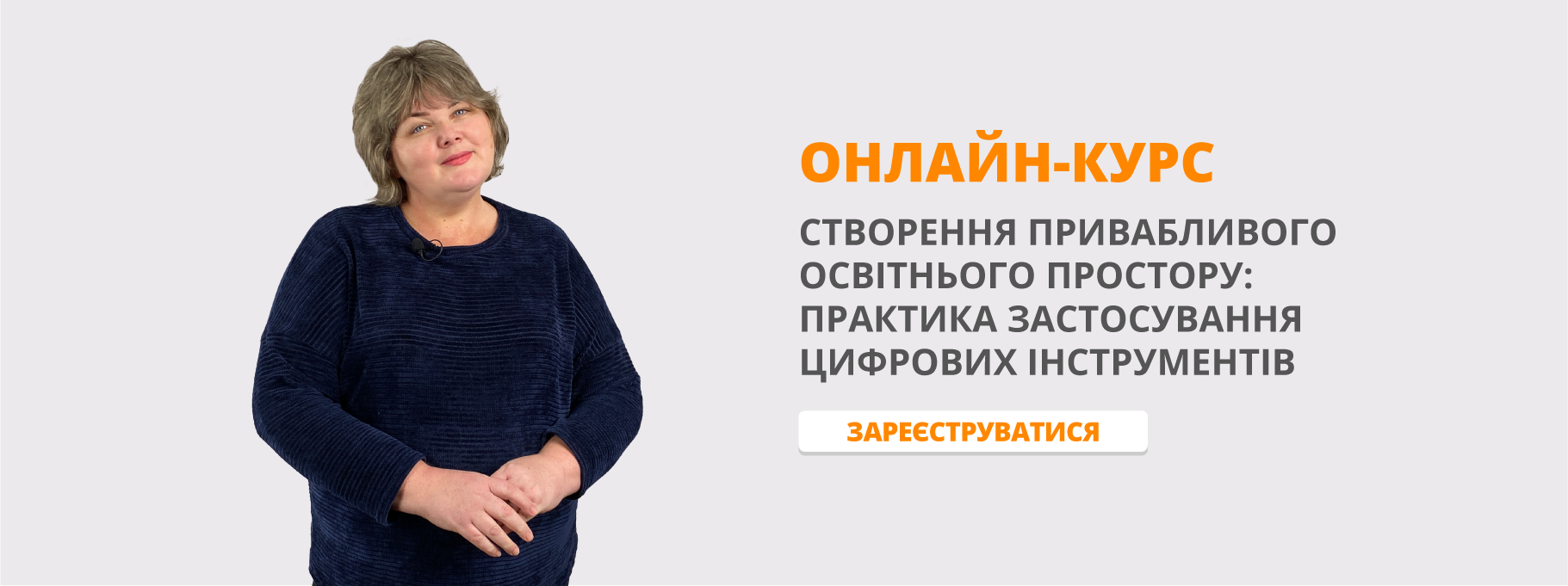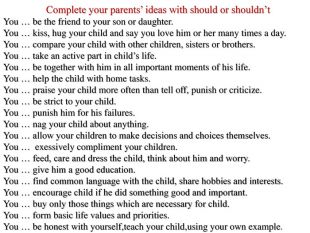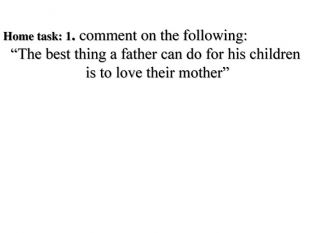Урок + презентація "How to be a good parent"
Level upper-intermediate
Topic “How to be a good parent”
Objectives: to revise and practise vocabulary on the topic; modals should\shouldn’t
To encourage pps’ speaking through problem solving situations
To develop pps’ reading and listening skills
To develop pps’ imagination and creativity
To foster pps’ respect for parents and adults
Materials: board, PC, projector, Worksheets (HO1), Discussion situations (HO2), PPt
presentation
PROCEDURE
1. Greeting.
Today, we continue speaking about family ties and relationships in the family.
2. Warming up:
We know that occasionally misunderstandings may happen within the family. This phenomena is called “A Generation gap”.
What is “A Generation gap”?
Why does it happen?
What can be done about it? (Ss’ answers)
(Suggested answers: A Generation gap is a lack of understanding between people of different generations; Because of breakdown in communication, different technological experience, etc; talk to each other with respect, explain things, behave responsibly)
3. Explaining the aim and the topic of the lesson.
Parent-child relationship is not only about technology and things like that. I reckon, you are often told how to behave or what things to do or not to do. Today we are going to learn to distinguish between methods adults commonly use to have children cooperate, sum up the results of your survey, you will role-play, practice modal should\shouldn’t and we will revise and practice the vocabulary which will help us discuss the topic question of the lesson “How to be a good parent” (slide 1)
4. Lead-in.
To start with, I suggest you listening to the poem by Michaela Morgan “The things mums say” and complete missing words. (HO1 ex 1) (slide 2) (note: for weaker class you may have the missing words written on the board)
4.1. Listening and gap filling.
Listen and check your answers (slide 3)
4.2. Brief discussion.
Which of these remarks do you hear from your mom?
Which are your mother’s favourites?
What can you add to the poem from your own experience?
5. Brainstorming vocabulary
Let’s brainstorm the verbs we can use to describe the things parents can do to children.
(Ss’ answers)
6. Vocabulary practice (HO1)
I wonder what your opinion is on the following. Make use of phrase bank 1(slide) (HO1) and phrase bank 2. The thing is that the expressions from phrase bank 2 can be used only once, so be attentive in order not to repeat them. (Ss’ answers)
Should parents be always strict with their children? Why?
What kinds of encouragements are the most effective?
What are the main ways of spoiling a child?
Should parent force their children to succeed in their studies at any cost?
How should parents teach their children to be responsible?
What kinds of punishment can be applied (застосовуватися) in bringing up children?
7. Reading. (Matching) (HO1 ex 2)
It’s time to learn to distinguish between methods adults commonly use to have children cooperate. You are going to work in pairs. Each pair will have the examples to illustrate these methods. Let’s read and pronounce them. You have to decide which method is illustrated. (slide 5)
(Ss’ answers)
8. Grammar practice. (HO1 ex 3)
Let us turn to experts’ opinion, the people who know about upbringing not from the text-books. I mean your parents. As home task you were to interview your parent asking just one question “How to be a good parent”. I have summarized their answers with the following result. Read through your parents’ advice and complete them with should or shouldn’t. (slides 6-7) (see Questionnaire)
(Ss’ answers)
9. Role-playing. (slides 8-14) (HO 2)
Now that you can distinguish between methods and have your parents’ advice and wisdom, it’s time to walk in your parents’ shoes, so to say. Your task is to react to the situations I will give you. All the rest guess what method is used, how effective it is giving your reasons.
(Ss’ answers)
10. Lesson outcome. Feedback.
To sum up let us draw the portrait of a good parent. One sketch from each of you.
11. SS evaluation
12. H\t comment on the following: “The best thing a father can do for his children is to love their mother”
***********************************************************************
Worksheets (HO1)
1. Complete the verse.
Wake up! Close your ……….and eat your food.
Get up! Look at that!
Out of bed! Don’t stare it’s……. .
…. your feet! ……….OFF the table please.
Mind your …….! ………..doesn’t grow on trees.
Don’t ……around! I won’t tell you again.
Don’t be late! Did you hear what I said?
Look at your room! I won’t tell you again.
What a state! It’s time for…… .
Put all your …… away now, please.
Why can I never find my………?
PHRASE BANK 1
To praise To lecture To tell off To nag To warn To blame for To insult To find fault To spoil
To encourage To punish To grant sufficient freedom To discipline To criticise To smack
To take privileges away To motivate To bicker
PHRASE BANK 2 (Giving opinions)
As far as I know, … I’m absolutely certain that … I’m fairly confident that … I’m positive that …
I’m pretty sure that … It seems to me that … Without a doubt, … You probably won’t agree, but …
Correct me if I’m wrong, but … I reckon/suppose … I tend to think that … What I think is …
Personally speaking / Speaking for myself, … The way I see it (is) … To the best of my knowledge, …
2. Read the following extracts and decide which methods these examples illustrate.
1. Blaming and accusing 5. Warnings
2. Threats 6. Martyrdom (exaggerated suffering)statements
3. Commands 7. Comparisons
4. Lecturing and moralizing 8. Sarcasm
(pair 1 ) a) “Just you touch that lamp once more and you’ll get a smack.” “If you don’t spit that gum out this minute, I’m going to open your mouth and take it out.” “If you are not finished dressing by the time I count three, I’m leaving without you.”
(pair 2 ) b) “Your dirty fingerprints are on the door again. Why do you always do that? Can’t you ever do anything right? The trouble with you is that you never listen.”
(pair 3 ) c) “Watch it, you’ll burn yourself.” “Careful, you’ll get hit by a car!” “Don’t climb there! Do you want to fall?”
(pair 4 ) d) “Why can’t you be more like your brother? He always gets his work done ahead of time.” “Lisa has such beautiful table manners. You’d never catch her eating with her fingers.”
(pair 5 ) e) “Do you think that was nice thing to grab that book from me? I can see you don’t realize how important good manners are. What you have to understand is that if you expect people to be polite to us, then we must be polite to them in return. You wouldn’t want anyone to grab things from you, would you? ”
(pair 6 ) f) “I want you to clean up your room right this minute.” “Help me carry in the packages. Hurry up!” “You still didn’t take out the garbage? Do it now! Move! ”
(pair 7 ) g) “You knew you would have a test tomorrow and left your book in school? How smart! That was a brilliant thing to do.” “Is this homework you are taking to school tomorrow? Well, maybe your teacher can read Chinese; I can’t.”
(pair 8 ) h) “Will you two stop that screaming? What are you trying to do to me, give me a heart attack!?” “Do you see these gray hairs? That’s because of you. You’re putting me in my grave.”
3. Complete your parents’ ideas with should or shouldn’t
You … be the friend to your son or daughter.
You … kiss, hug your child and say you love him or her many times a day.
You … compare your child with other children, sisters or brothers.
You … take an active part in child’s life.
You … be together with him in all important moments of his life.
You … help the child with home tasks.
You … praise your child more often than tell off, punish or criticize.
You … be strict to your child.
You … punish him for his failures.
You … nag your child about anything.
You … allow your children to make decisions and choices themselves.
You … exessively compliment your children.
You … feed, care and dress the child, think about him and worry.
You … give him a good education.
You … find common language with the child, share hobbies and interests.
You … encourage child if he did something good and important.
You … buy only those things which are necessary for child.
You … form basic life values and priorities.
You … be honest with yourself,teach your child,using your own example.
Discussion situations (HO2)
What would you say in the following situations if you were a parent?
1. You child has come back after a walk. His clothes are dirty and he has a black eye.
2. Your 5-year-old boy is teasing a little girl in the sandpit.
3. You caught your teenage son smoking.
4. Your daughter has got a bad mark at school.
5. It’s very late, but your child hasn’t done his homework because he has been watching an interesting TV programme.
6. You have come home tired after work, but the sink is full of dirty dishes.
7. Your little child doesn’t want to put his toys away.
***********************************************************************
Questionnaire
Ask your parents to share their ideas on how to be a good parent. Write down their answers in the form provided. Use either affirmative or negative statements, or both.
PLEASE NOTE! THE answer “Parents should love their children” is not accepted as the most obvious and general one.
MOTHER:_____________________________________________________________
FATHER:_____________________________________________________________
Please send your questionnaires on e-mail or have them printed at the lesson on lesson date
***********************************************************************
poem by Michaela Morgan “The things mums say” https://www.youtube.com/watch?v=FN4hNyZ3YK8


про публікацію авторської розробки
Додати розробку






























